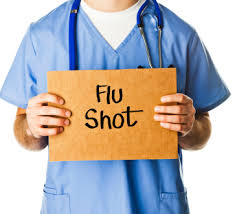Many health professionals recommend seasonal influenza (flu) vaccines as a preventive measure. But are they safe? Are they necessary? Do they actually work? Or are they a shot in the dark? The debate rages  on, but the U.S. Center for Disease Control still urges families to get vaccinated against flu every year -- not only to safeguard their own health, but to prevent a large scale epidemic from taking hold in the U.S.
on, but the U.S. Center for Disease Control still urges families to get vaccinated against flu every year -- not only to safeguard their own health, but to prevent a large scale epidemic from taking hold in the U.S.
Most seasonal flu activity takes place from October through May, and commonly peaks in the Northeast between December and February. The U.S. Center for Disease Control (CDC) recommends a yearly flu vaccine for everyone 6 months of age and older. October is the best month to be vaccinated, since this is the month that the new flu vaccines are available and it is still well before the peak of the flu season goes into full swing.
If you are on side of the debate that gets a flu shot, or prefers to avoid them, there are important everyday steps you can take to safeguard yourself and your family against the flu. These steps include staying away from sick people and washing your hands to reduce the spread of germs. If you come down with the flu, make sure you stay home from work or school, to prevent spreading the flu to others. If your symptoms seem serious, make sure you pay a visit to your primary healthcare provider.
What to do if you come down with the flu.
If you experience flu symptoms, it is best to pay a visit to your US Family Health Plan primary care physician. There are antiviral prescription drugs that can be used in some situations to treat flu illness.
Some people are at more risk of serious flu complications than others. High risk candidates include children under 2, adults 65 and older, pregnant women, and people with certain medical conditions. People who fall into this high risk category, as well as people who come down with a very bad case of the flu, should seek medical treatment immediately. High risk cases often require prescription antiviral drugs to combat the disease. Prompt treatment can mean the difference between having a milder illness versus very serious illness that could result in a hospital stay.
who fall into this high risk category, as well as people who come down with a very bad case of the flu, should seek medical treatment immediately. High risk cases often require prescription antiviral drugs to combat the disease. Prompt treatment can mean the difference between having a milder illness versus very serious illness that could result in a hospital stay.
Where can I get my 2015 flu vaccine? As a member of US Family Health Plan – a TRICARE PRIME healthcare option– there are three ways you can get your flu vaccination at no cost. You can always make an appointment with your US Family Health Plan primary care physician, you can go to any local CVS pharmacy using your US Family Health Plan ID card or Military ID card, or you can visit Maxor Pharmacy online at http://www.maxor.com/maxorplus/members to find information on how to locate your closest US Family Health Plan flu shot provider.

